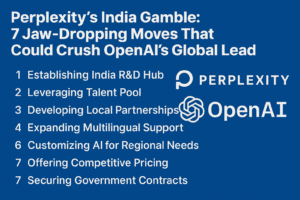Perplexity’s India Gamble: 7 Jaw-Dropping Moves That Could Crush OpenAI’s Global Lead
Perplexity is aggressively pursuing India as a critical growth lever against OpenAI, betting on massive scale through unconventional partnerships. Its exclusive deal with Airtel—offering 360 million subscribers a free year of Pro tier access—sidesteps India’s price sensitivity to drive unprecedented user acquisition. This complements earlier integrations with Paytm’s massive app, creating a strategic funnel. While Perplexity’s user growth (640% YoY) outpaces ChatGPT’s in India, monetization remains its Achilles’ heel—ChatGPT earned $9M there last quarter while Perplexity trails significantly.
India’s mobile-first users, limited local AI rivals, and vast data potential make it fertile ground, but converting free users to paying subscribers post-trial is the real test. Success here could redefine global AI competition by proving emerging markets are not just users, but essential strategic assets. Perplexity’s India gamble isn’t a shortcut—it’s a high-stakes chess move.

Perplexity’s India Gamble: 7 Jaw-Dropping Moves That Could Crush OpenAI’s Global Lead
While OpenAI dominates headlines and Western markets, Perplexity is executing a radically different playbook that could redefine the AI battleground. Their aggressive push into India isn’t just expansion – it’s a calculated end-run around OpenAI’s fortress, leveraging unique market dynamics in ways few competitors can replicate. Here’s what this high-stakes strategy reveals:
- The Telco Trojan Horse: Cracking the Adoption Code
- Brilliance: Partnering with Airtel isn’t just distribution – it’s behavioral engineering. Offering free Pro access to 360 million users bypasses India’s extreme price sensitivity instantly. This solves the critical “first touch” problem plaguing premium AI services in emerging markets.
- Scale vs. Cost: Perplexity likely accepted minimal immediate revenue for unparalleled user acquisition velocity. The gamble? Convert even a small percentage of this massive base into paying users after the free year, or leverage the user data for model improvement at a scale impossible elsewhere.
- Exclusivity Matters: Locking out rivals like Jio is a defensive masterstroke, forcing competitors to find alternative, less effective routes to market.
- Beyond Downloads: The Underrated Growth Engine
- Hypergrowth Context: While Perplexity’s 640% YoY MAU growth in India is staggering, comparing its 3.7 million MAUs to ChatGPT’s 19.8 million misses the point. Perplexity is starting from a much smaller base and achieving faster relative growth in a market where OpenAI already has massive brand recognition. This signals potent product-market fit.
- Strategic Sequencing: Partnerships with Paytm (500M+ downloads) before Airtel demonstrate a layered approach. They first embedded their tech within a ubiquitous financial app, building familiarity, before unleashing the telco-powered free access tsunami. This isn’t random; it’s a user onboarding funnel at a national scale.
- India: The Perfect Asymmetric Battleground
- Weak Local Rivals: Unlike China, India lacks dominant homegrown AI search giants. Perplexity faces Google (adapting slowly) and OpenAI (globally focused), not entrenched local champions.
- Mobile-First Primacy: India’s internet growth is predominantly mobile. Perplexity’s app-centric, concise-answer model aligns perfectly with smartphone usage patterns and patchy connectivity, unlike bulkier desktop-focused AI tools.
- The Data Advantage: Millions of new Indian users interacting with Perplexity daily generates unique training data – diverse queries, languages (English + Indic languages), and local context. This data is gold for refining relevance in a massive, underserved market and could improve global performance.
- The Elephant in the Room: Monetization Mirage?
- ChatGPT’s Revenue Dominance ($773M vs. $8M globally) highlights Perplexity’s existential challenge. India’s contribution to ChatGPT’s $9M in-app revenue (despite price sensitivity) proves some monetization is possible, but Perplexity starts from near zero there.
- The Airtel Free Year Dilemma: Will users pay $200/year after experiencing it free? Or is this merely training users to expect free AI? Perplexity must demonstrate undeniable value superiority over free alternatives (including Google Search) during this grace period.
- Alternative Paths: If direct subscriptions stall, Perplexity might pivot to:
- B2B2C: Licensing its search tech to more Indian apps/platforms (following the Paytm model).
- Premium Telco Bundles: Partnering with Airtel on tiered paid plans post-free period.
- Targeted Advertising: Highly controversial, but potentially viable with massive scale.
The Real Insight: It’s Not (Just) About India
Perplexity’s strategy reveals a fundamental truth in the AI platform wars: global dominance won’t follow a single path. While OpenAI leverages its first-mover advantage and model prowess in established markets, Perplexity is exploiting a “leapfrog opportunity”:
- Acquire Massive Scale Fast: Use unique emerging market partnerships (telcos, super-apps) to get users OpenAI can’t easily reach at that volume/cost.
- Refine on Unique Data: Train models on the vast, diverse datasets this scale provides.
- Leverage for Global Position: Use the resulting scale, improved models, and proven emerging market playbook to compete more effectively everywhere, including challenging OpenAI in the West eventually.
The Verdict: High Risk, Transformative Potential
Perplexity isn’t just taking a shortcut; it’s building an entirely new highway. Their India bet is a bold, capital-intensive gamble on user acquisition at a scale previously unseen in AI. Success hinges on converting that user tsunami into sustainable revenue – a challenge even giants like Google wrestle with in India. If they crack it, they rewrite the rulebook for AI competition. If they fail, it becomes a cautionary tale of growth without monetization. One thing is certain: the AI race just got a lot more interesting, and the battleground has decisively shifted east. Perplexity is betting its future that India isn’t just a market – it’s the key to becoming a global contender.
You must be logged in to post a comment.